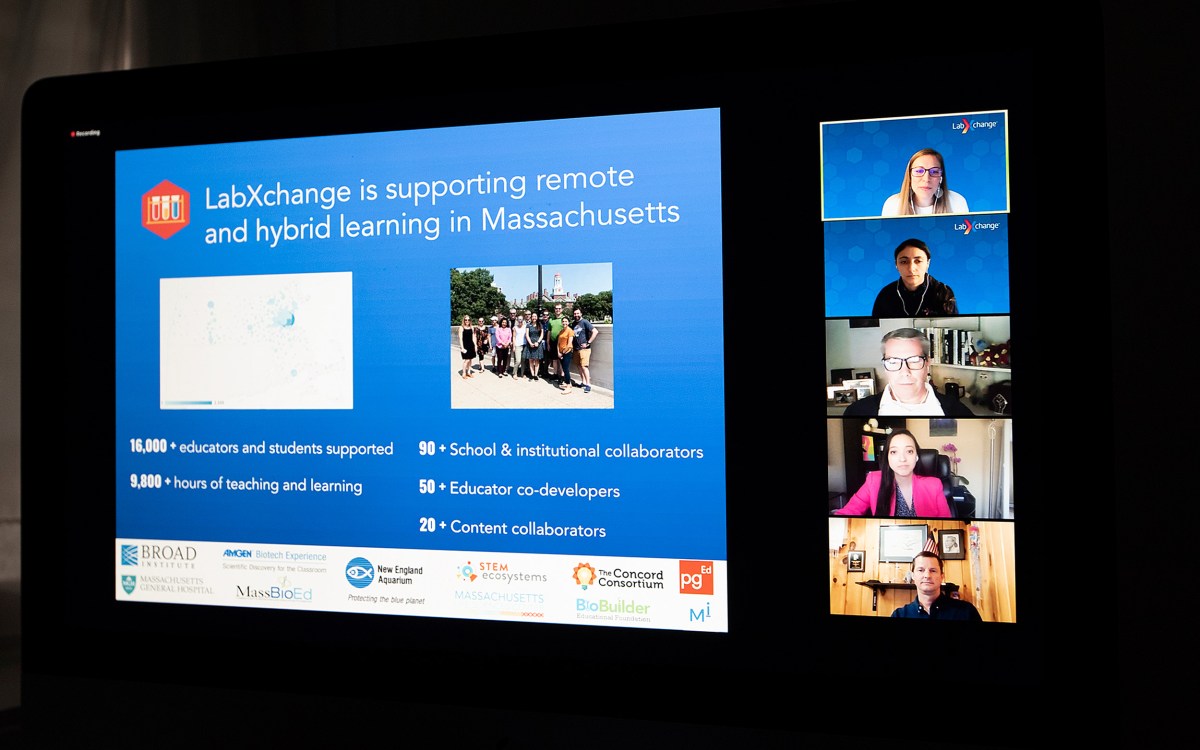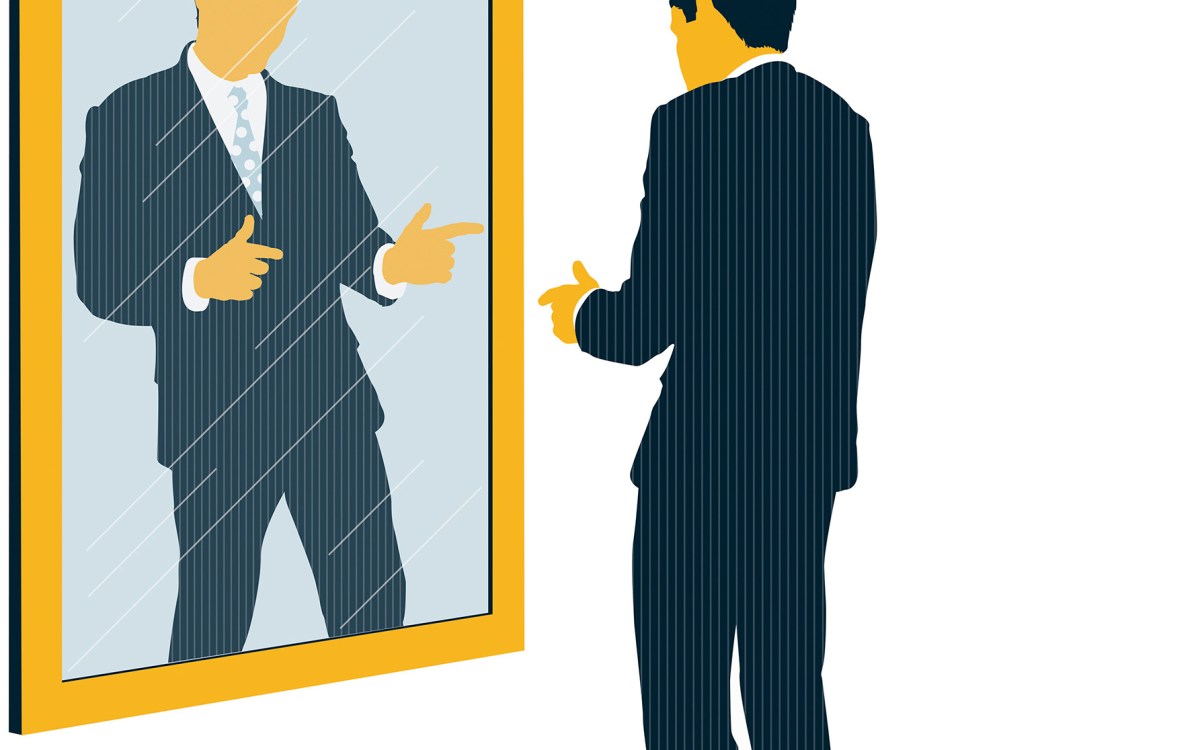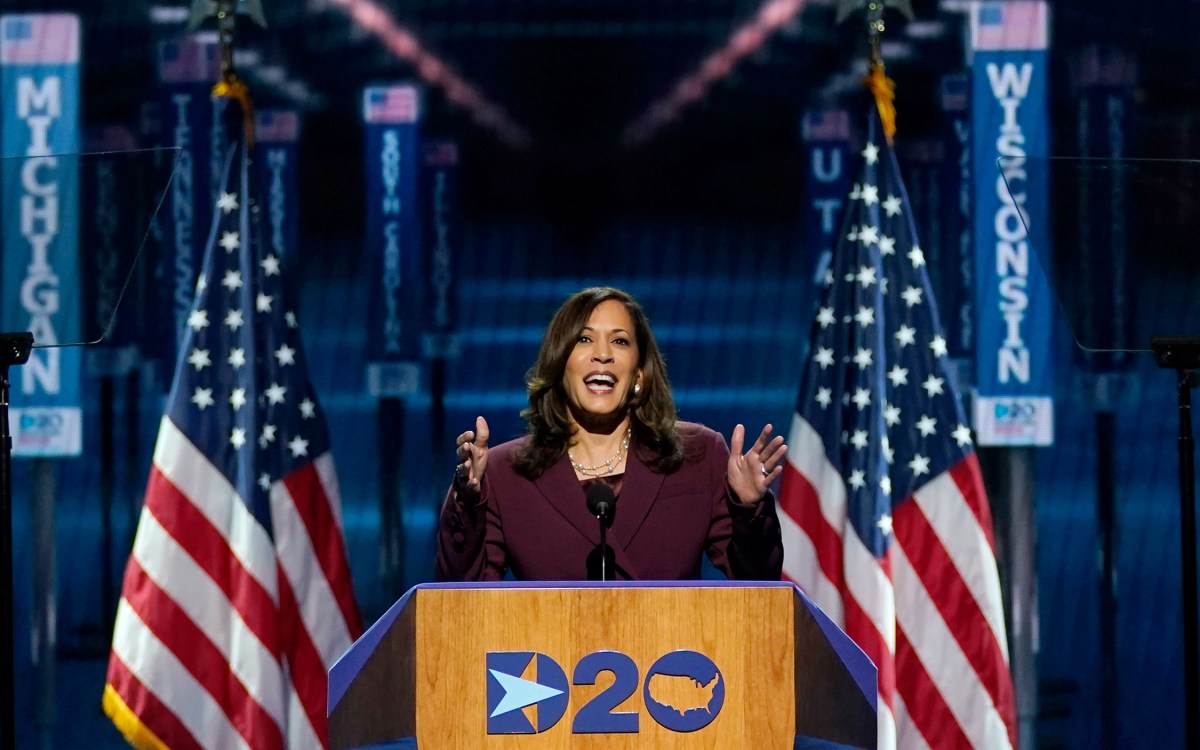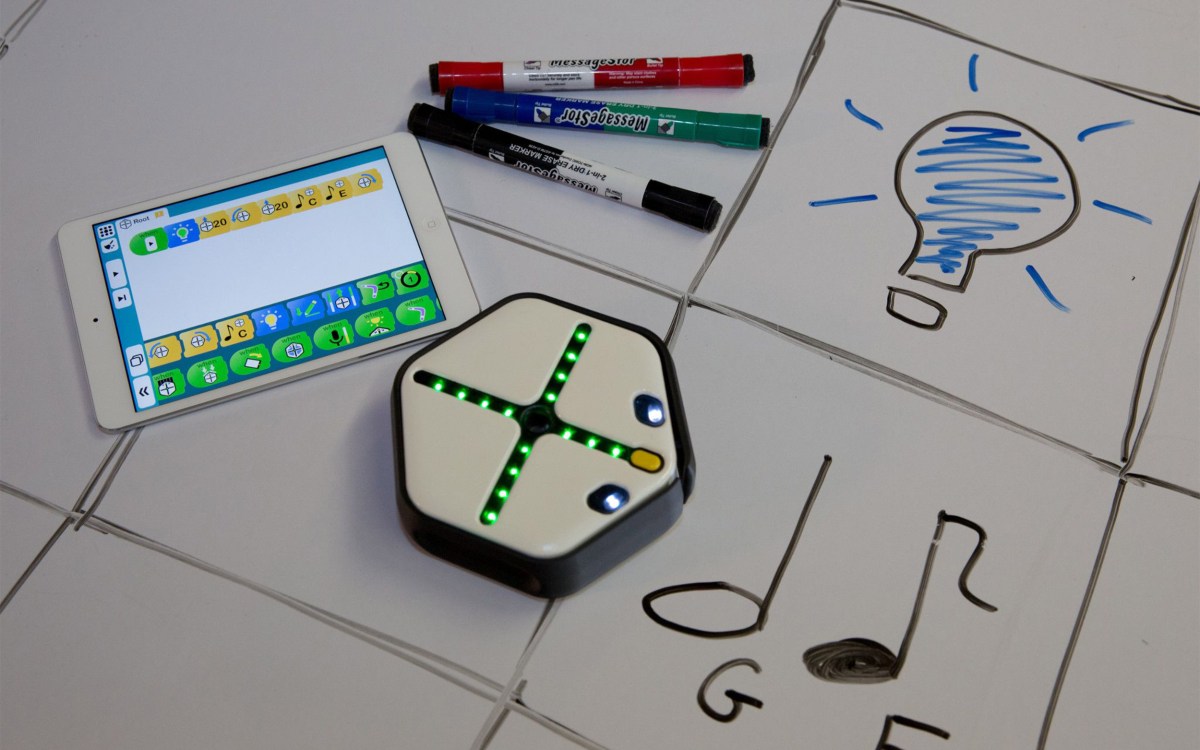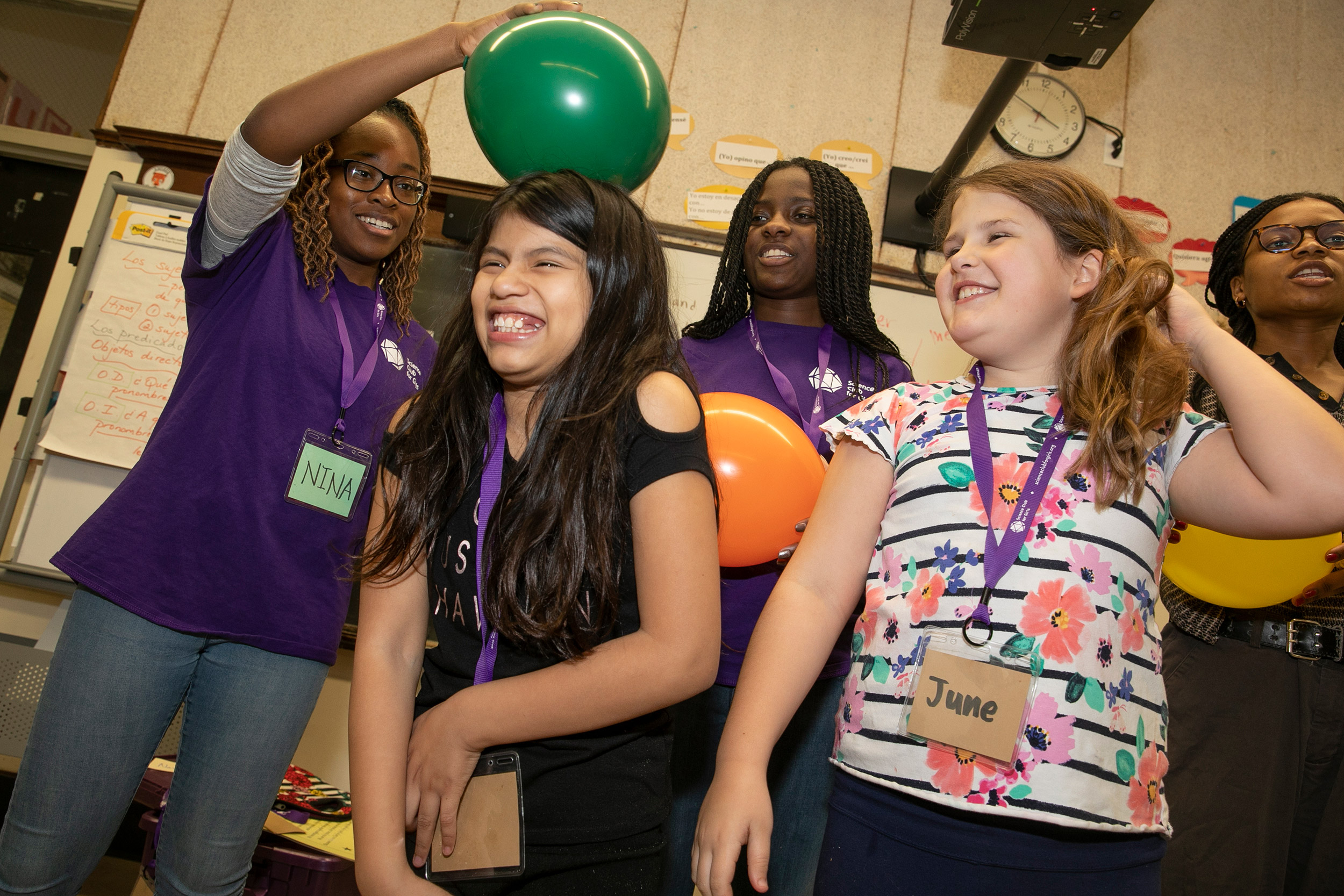
Back in early March, Nina Uzoigwe ’21 (left) demonstrated static electricity with a balloon on the head of a student as Kaelyn Brown ’21 (back left) and her sister Cierra Brown ’23 (back right) looked on. The pandemic forced the club to halt its in-person programming, moving it online.
Photos by Jon Chase/Harvard Staff Photographer
A science club for girls
Harvard students, alumnae work to inspire next generation of diverse female scientists
Kaelyn Brown has wanted to be a scientist since she was 6, and the dream stuck with her through grade school. Today the senior neuroscience concentrator has been interning for two years in a cancer research program at the Dana-Farber Cancer Institute, and this year has been researching neurobiological mechanisms in people addicted to smoking at the McLean Imaging Center in McLean Hospital. She is well on her way.
Brown knows her story is not typical. Few girls pursue a career in the sciences. Women make up less than a third of all employees in the science and engineering workforce. Broken out by race, the situation looks even bleaker. Black females, like Brown, account for about 8.5 percent of the workforce, while Latinas are at about 7.8 percent, all according to the National Science Foundation.
That is why Brown and Ashley Cooper ’21, who’s a joint concentrator in neuroscience and social anthropology, and a group of about 20 other female students from Harvard are trying to inspire the next generation of women scientists by volunteering with Science Club for Girls, the very same after-school program that first opened the world of science to Brown.
“Science Club for Girls really shaped me into who I am today,” Brown said. “A lot of my career goals go back to Science Club for Girls and the speakers and women who came in, especially Black women, who gave me the foundation and the confidence that really helped me in my later years when my confidence was consistently challenged by myself and peers.”
Brown and Cooper are co-directors for the Harvard College chapter of Science Club for Girls, which is based in Cambridge and run by Bonnie Bertolaet, Ph.D. ’93. Brown and Cooper revived the Harvard partnership with the program in the fall of 2019. The pair worked since 2018 to restart the Harvard chapter since it went on hiatus in 2017, when the organization restructured.
“Representation is visceral,” said Cooper. “The most important part for us is really being there, embodying what these girls want to do and endeavor to do in their future.”
Science Club for Girls co-director Ashley Cooper ’21 instructs a pair of very focused students.
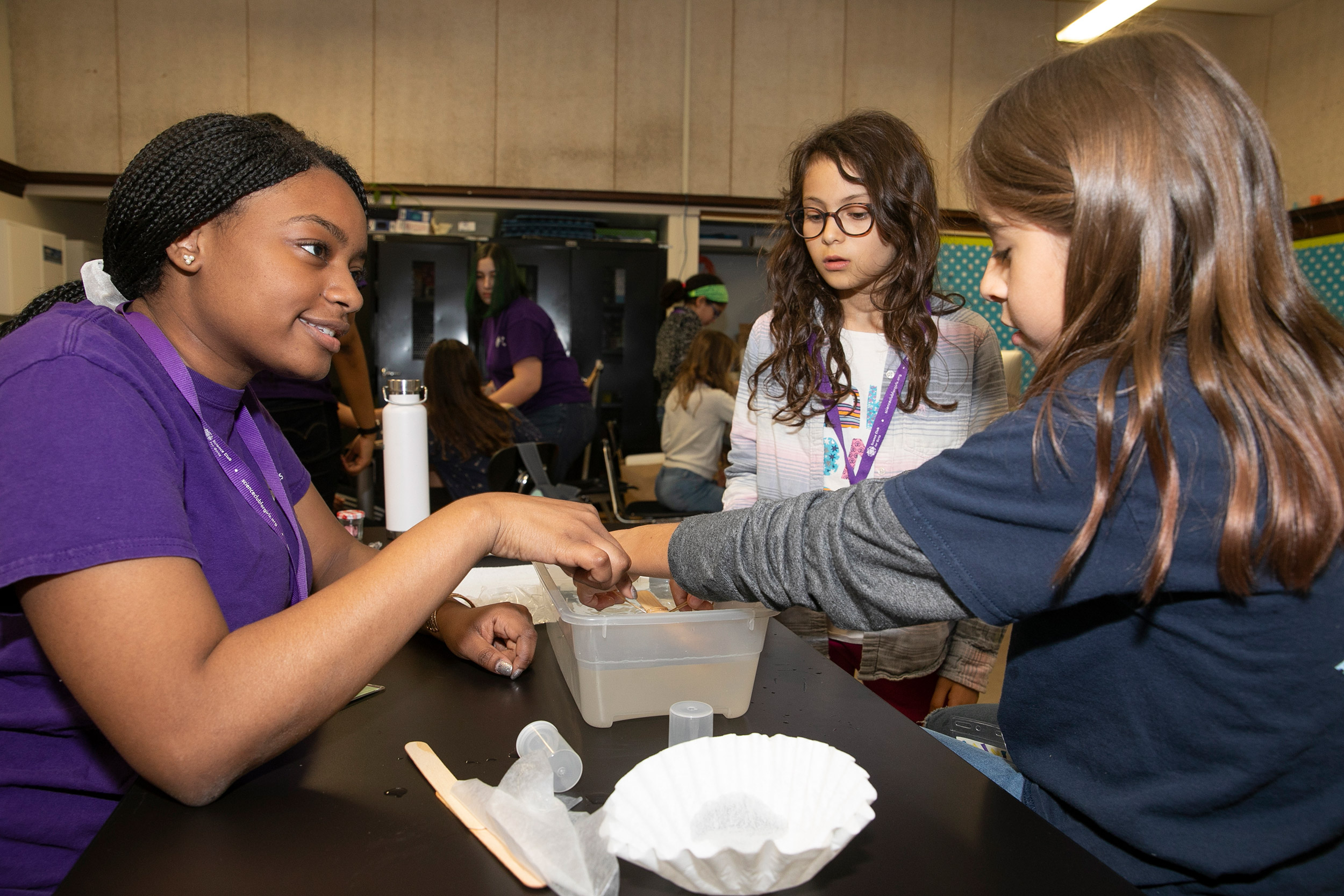
She and Brown received an award from Science Club for Girls in October for their leadership in bringing the club back to Harvard at a virtual ceremony. The annual award recognizes outstanding leadership in building a more diverse and inclusive STEM community.
The club was started in 1994 by two Cambridge mothers who were concerned about gender equity around STEM education and the marginalization of girls of color and those from low-income backgrounds. In 2016, 80 percent of girls from the program were from underrepresented communities, and 100 percent went on to college, including Harvard, Boston University, and Northeastern University.
In normal times, the clubs meet once a week at seven K-8 schools scattered throughout Cambridge, Somerville, and Boston. Mentors like Brown and Cooper lead activities and experiments. Junior mentors, made up of eighth through 12th graders, assist the older mentors, who are college students or STEM professionals. The program has student volunteers from Bunker Hill Community College and University of Massachusetts, Boston as well.
Due to the pandemic, the club has halted in-person programming and moved online. Students and mentors are being mailed lab kits for experiments. Previous topics during sessions have included chemistry, astronomy, physics, and experiments like dissecting owl scat, digging through dirt, or learning about the body’s circulatory system.
Last spring at the Amigos K-8 school in Cambridge — one of two locations where Harvard students mentored last year — elementary pupils learned how static electricity works by having a balloon rubbed on their heads and working with circuitry.
“It’s fun. We often hear a lot of screams,” said Bertolaet, the organization’s executive director. “One of our mentors said one of their favorite things was the screams of disgust and delight. There are so many girls who are just screaming, ‘I love this!’ and that’s what you want to hear.”
Bertolaet, who holds a doctorate in chemistry, said she remembers, at times, being the only woman in some of her classes. In 2019, she helped organize a day of chemistry for the middle school girls with Harvard Women in Chemistry, a group made up of graduate students and postdoctoral fellows in the Harvard Department of Chemistry and Chemical Biology. The group then took the junior mentors out to lunch to talk to them about next steps they can take, such as college, graduate school, and careers in chemistry.
“We loved working with them in the lab,” said Shelby Roseman, community committee chair for the group and a graduate student in the chemical biology program at the Graduate School of Arts and Sciences. She works in the Liau Lab. “The girls were clearly excited by the experiments, which made the event fun for everyone. … One moment that stood out was when we performed the first color chromatography [a procedure for separating mixtures], and the girls watched one color separate into multiple pigments. The girls all wanted to try every different color.”
Ashley Cooper (middle) and Kaelyn Brown (right) with Science Club for Girls Executive Director Bonnie Bertolaet.
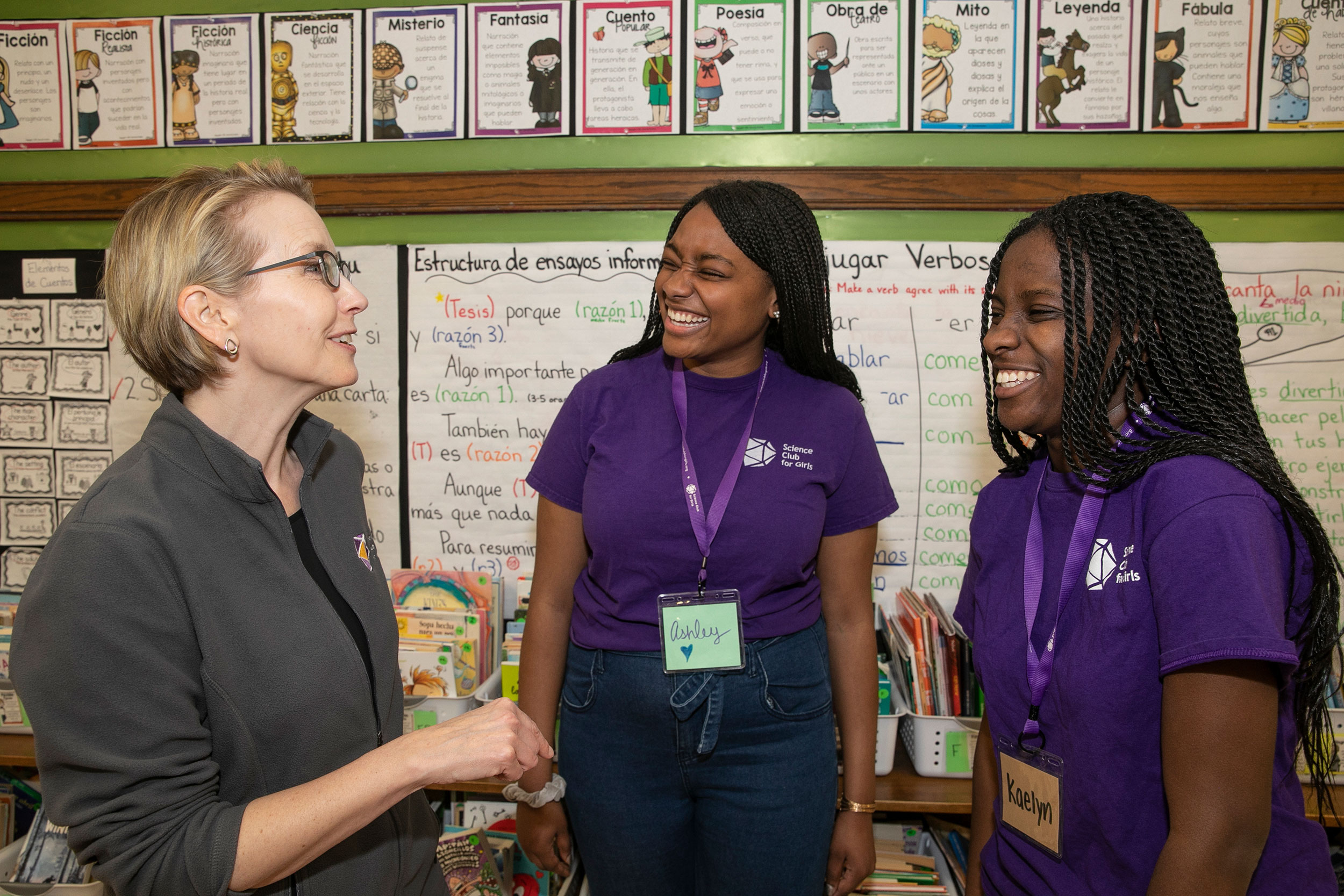
Brown and her sister, Cierra, now a sophomore at Harvard, started at the club when they moved to the Boston area from North Carolina. They progressed from being mentees to junior mentors and returned as mentors. Both can attest to the impact of the program.
Brown, for instance, remembers when she got accepted into Harvard and told some of the students in the club her big news.
“One of my mentees, she’s sitting right next to me and she goes, ‘Oh, you’re going to Harvard? Well, I’m going to MIT,’” Brown said. “I could not stop smiling because as a young Black girl growing up, I never thought that I would be here, so to hear her say that with such confidence at 12 years old was just amazing to me.”
Cooper said she’s seen some of that confidence since joining as a mentor in 2017.
“Representation is visceral. The most important part for us is really being there, embodying what these girls want to do and endeavor to do in their future.”
Ashley Cooper
“One of the students that I worked with as a second grader during my first year, I now see as fourth grader,” said Cooper last semester. “She used to ask me a lot of questions about if she can actually go into science and that she didn’t see people who look like her going into these fields. Now, she’s so emboldened and engaged within all the conversations in her classroom setting. It’s just really beautiful to see how she does have a place and that she can take up space in that way.”
Cooper has even seen it in her own sense of self.
“Imposter syndrome is still very real,” Cooper said. “I know that I experienced that very heavily coming into Harvard, and as I went to like a public school in New Jersey, but wasn’t sure how to navigate that space … [the club] helped me reflect on it more deeply and that has really allowed me to overcome some of my feelings of not feeling worthy of being in certain lab environments. I see students gain a sense of self-understanding that I think is not always there without hearing experiences from older mentors.”
Both students, who are also involved with the performing arts at Harvard, agree that the program is essential during the current climate as the nation’s racial inequity spills into academia with movements like #ShutDownSTEM, Black Birders Week, and — the latest — Black in Microbiology.
“The club is a gateway for a lot of young women — specifically women of color, specifically Black women,” Brown said. “I’m helping build up a community that, in a lot of ways, has never really been meant to succeed in our society.”
Added Cooper: “It’s something that all young girls really need.”



